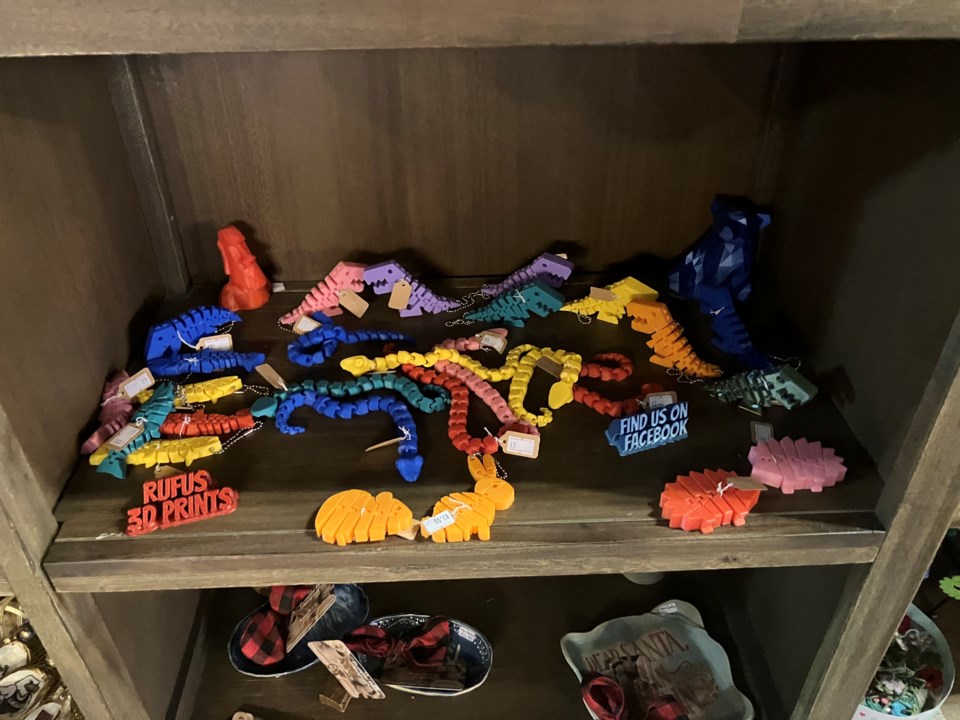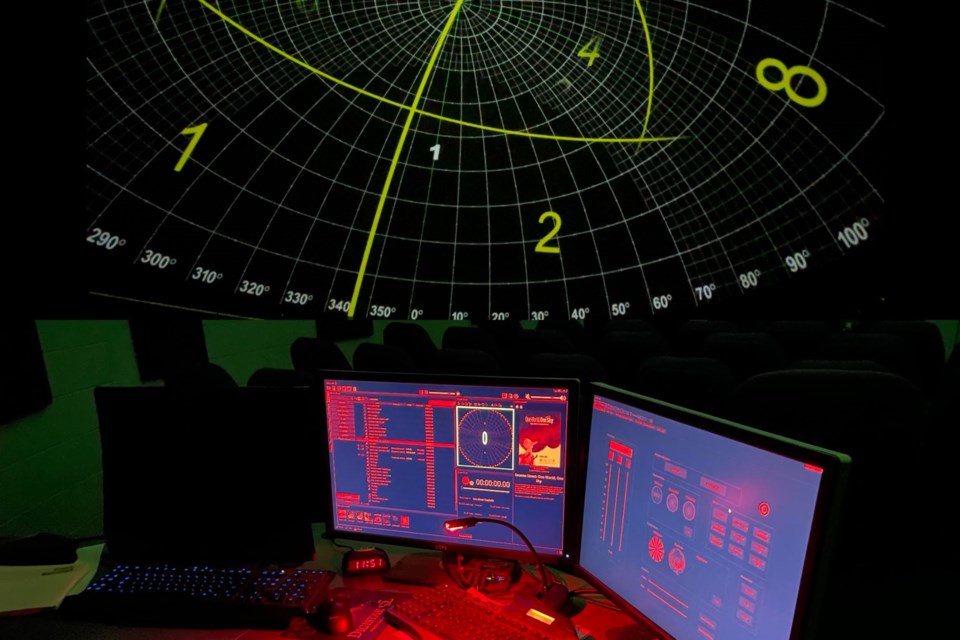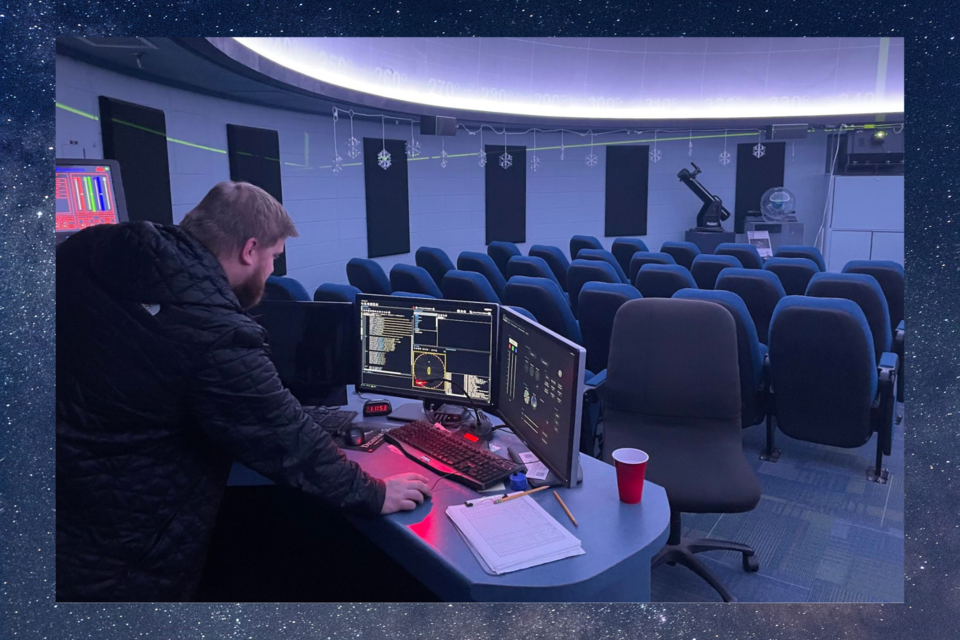Every week, groups of elementary school students sit down to watch educational and entertaining shows in the Georgia Southern University Planetarium, where they learn about space and the celestial bodies within it.
Like them, Dillon Marcy has been visiting Georgia Southern University since he was a kid, when his parents would bring him to the football games on campus. It was early in his youth that he was introduced and drawn to the constellations projected across the university’s planetarium dome.
Today, Marcy is a Georgia Southern alum working in that same room as the planetarium and astronomy lab coordinator, teaching another generation about the wonders of astronomy and presenting shows that all members of the community can enjoy.
His academic interest in the stars traces back to his early adolescence when he began looking at the sky with more curiosity. Marcy remembered his mom’s “ancient” book about the stars and a middle school future-career questionnaire that encouraged him to pursue astronomy.
Marcy says he became fascinated by physics in his senior year of high school, wanting to learn about the smallest parts of the universe. The intricate calculations of the study, however, did not appeal to him as much as teaching and encouraging the curiosities of the planetarium's young visitors.
Marcy says that astronomy asks questions about the properties of space, the grand scheme of the universe and applying physics beyond our own planet, which have led to discoveries such as understanding how black holes work.
“The world is doing all these incredible things, but we are simple humans that are numb to it,” Marcy said, later expressing that getting to answer the children’s questions is his favorite part of running shows at the planetarium because of their inquisitive nature.
Marcy’s teaching goes beyond the planetarium as an astronomy lab coordinator. In the lab, he assists lecturers and works with Georgia Southern students to help them learn about topics like the composition of asteroids, activity on the sun, orbital patterns of moons in our solar system and how to calculate and project the location of objects moving in space.
He also participates in evening labs, where students get more hands-on experience with activities using telescopes to view different astronomical bodies.
Beyond his work with Georgia Southern, Marcy’s connection to the community extends to a 3-D printing side-business. He makes trinkets like dinosaurs and fish that are sold for $3 apiece at Cool Beanz Espresso Bar in downtown Statesboro. He says that this is more of a hobby than a source of revenue, and the profits mostly go to paying for the materials that he uses.

Marcy says he appreciates the evolution of astronomy as a science, with modern studies dealing mostly in quantum physics and technological advancement. He says in science, we learn something and then it can be undone by learning something else and perfecting methods, such as in the case of Albert Einstein's theory of relativity proving to be more accurate than Newtonian physics in some applications.
“The universe can't lie to you, but our calculations can,” Marcy said.
He says astronomy influences society as a whole and has been etched deeply into the chronicles of humanity. Consequently, discoveries that shake the familiar notions of science have often been rejected throughout history.
The heliocentric (sun-centered) assertions made by Nicolaus Capernicus were in opposition to his own (Catholic) church’s accepted belief that the Earth was the center of the universe. Galileo Galilei was famously convicted of heresy by the Catholic church 90 years after Copernicus’ publishing for defending a similar sun-centered model. Now we know that neither the Earth nor the sun is the center of the universe, yet the contributions of great scientists of the past have been essential to contemporary understanding of the natural world.
Vital but less appreciated roles were played behind the scenes of some of the major discoveries that shape our modern perception of the stars as well. Marcy alluded to the historically nameless women of astronomy, known as human computers, who performed many of the necessary and tedious calculations by hand before our contemporary technologies were available.
We have these figures to thank for the expansion of this science and the extensive knowledge we enjoy about astronomy today, which makes programs such as those at Georgia Southern University possible.

“For years, planetariums were a dying breed,” said Marcy. But the technology has become cheaper and more streamlined so you don’t need an astronomer to run them, and they are once again rising in popularity, with some companies projecting growth of up to 50%.
Marcy was an intern with his predecessor, former astronomy lab coordinator Becky Lowder, before stepping into the role more than eight years ago. With the addition of new shows, he has been working with the same 5th generation Digistar Laser projecting system that he learned to operate back then. It is rumored however, that the planetarium will be seeing extensive technology upgrades in the future.
Marcy says that while the work of an educator can be strenuous and draining at times, he appreciates the flexibility and growth of his job with the physics and astronomy program at Georgia Southern and intends to stay here for a few more revolutions around the sun.
For information about public show times and ticket purchasing, visit the Georgia Southern University Planetarium webpage. Stay tuned to Grice Connect, as well. As always, we'll let you know when tickets go on sale for the next exciting show!




